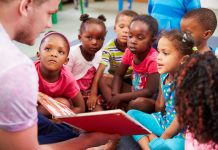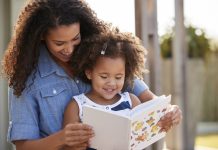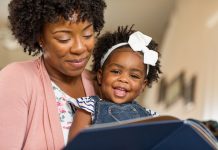Rachael Amin, Educational Copywriter at Pentagon Play, explains how to develop communication and language skills in the early years and beyond
Literacy, communication and language skills continue to be a main Early Years priority, with 10% of UK children having long-term speech, language, and communication needs (NHS England, 2020). Effects of the COVID pandemic are still evident, with pupils displaying delays in speech and language progress.
Government briefings state that practitioners report limited vocabulary, children lack the confidence to speak, babies struggle to respond to basic facial expressions, and some providers have commented that children speak with accents and voices similar to content they have watched.
There is a clear need for parents, educators, and specialists to work together to combat this problem, to help our young children to communicate effectively, and adequately prepare them for lifelong learning.
Parents are the primary educators in their children’s lives
Babies closely watch and copy their parents’ movements allowing them to communicate before they can speak, through gestures such as waving, nodding, passing, and pointing.
Sharing nursery rhymes and songs together provides an important introduction to repetition and natural rhythm. Babies and toddlers observe adults closely, listen to sometimes complex vocabulary and join in with actions.
First words begin between nine and fourteen months of age, with most children understanding more words than they can say.
As my own children started to combine words, I would subconsciously talk more and help to extend their growing vocabulary. If they pointed and said ‘dog’ I would respond with ‘Hello, little, fluffy dog,’ or ‘flower’ I would say ‘Yes, a beautiful, purple flower.’
Everyday routines and trips help to develop children’s speech as they talk about events and things they encounter.
Even a trip to the supermarket can provide an opportunity for children to discuss infrequent words as they search for objects on their shopping list!
Plenty of time for play
Between two and three years of age, children typically produce longer more complex sentences. At this stage, play has a huge impact on speech development as children seek adult interaction in a move towards cooperative play.
When adults engage in play, they can get down to a child’s eye level and give their full attention.
During conversations in play, it is important to pause and give young children some thinking time to formulate a response instead of answering for them.
Playing with small world resources allows children to create their own narratives. Toys with links to STEAM such as building blocks, marble runs and puzzles allow children to discuss causes and consequences as they make predictions and provide explanations.
Intergenerational play can have a big impact on language development which was lacking during the COVID pandemic. My own children’s eyes seem to sparkle when they engage in conversations, natural storytelling and imaginative play with their Grandparents.
Play may imitate life as children practise eye contact, listen and learn to take turns. The bottom of my stairs often transforms into a bus ready to pick up passengers. My cupboards are raided to create a pretend shop and paper and recycled packages are the perfect resources for a post office.
During role play, children practise language they have heard, take on familiar roles and recreate scenes from their everyday life. Grammatical errors can be made at this stage, such as ‘I runned’ instead of ‘I ran’ or ‘James do it’ instead of ‘I will do it.’ This shows use of trial and error when experimenting with language forms. Gentle modelling can help to embed the correct use of tense.
Outdoor environments can positively affect the quality of a child’s development
Natural outdoor environments can positively affect the quality of children’s speech, communication and language skills.
An environment that continually changes and evolves helps to build a rich vocabulary. Den building, scavenger hunts focusing on positional language and outdoor walks encompassing all senses can scaffold language development.
Less confident pupils may find their voice in a calm, tranquil outdoor environment.
Reading is key to language development
For pupils to enjoy and understand language, they should be exposed to a wide variety of stories, plays, poetry, and non-fiction texts to develop a real love of books from a young age. I believe that children are never too young to be read to and never too old to stop. Often when children can read independently, parents stop reading to them, yet sharing a text with a child can significantly boost speech, communication and language skills and encourage reading for pleasure.
Vocabulary can be discussed; effects of punctuation can be observed, and the use of voice can create moments of excitement or tension. Pupils begin to understand different sentence structures. They learn to reflect critically on issues raised in texts and talk confidently about what they have read. Children with strong vocabulary and grammatical skills at an early age, often demonstrate advanced reading comprehension as they progress through school.
Competency in spoken language is arguably the most important element of early learning and beyond. Pupils need to be able to express their thoughts and feelings clearly and understand what is being asked of them.
Communication and language skills are needed to access the entire Primary National Curriculum and underpin reading and writing development. One in four children who struggle with language at the age of five do not reach the expected standard in English at the end of primary school.
Early identification, targeted support and monitoring can make a real difference in children’s language learning and later academic success. Parents and educators should strive to demonstrate how fun words, sounds and sentences can be, encouraging our young children to experiment and express themselves through spoken language.
In closing, Becky Hazell, Sales and Education Director at Pentagon Play said: “Speech and language is fundamental to all other skills children develop along their lifelong learning journey, it helps with problem-solving, social and personal development as well as providing a vehicle in which children can begin to recognise their own emotional wellbeing and feelings.”

















